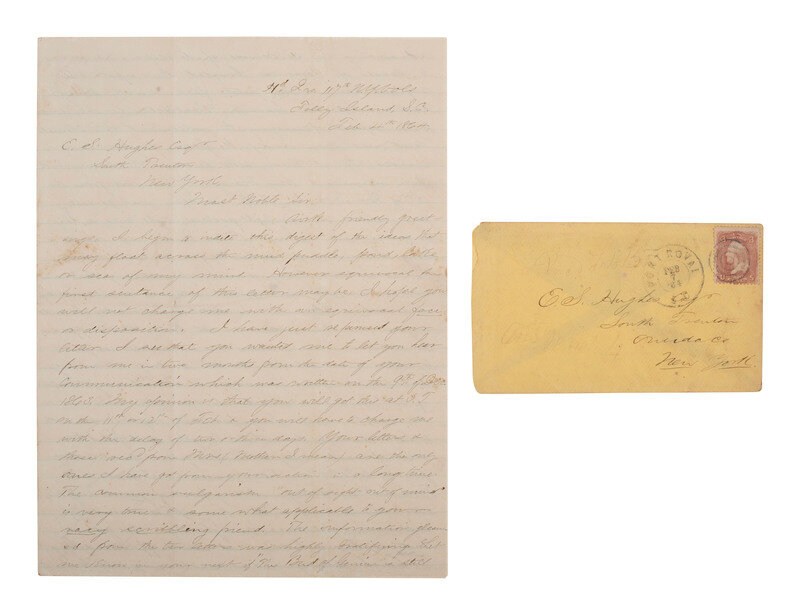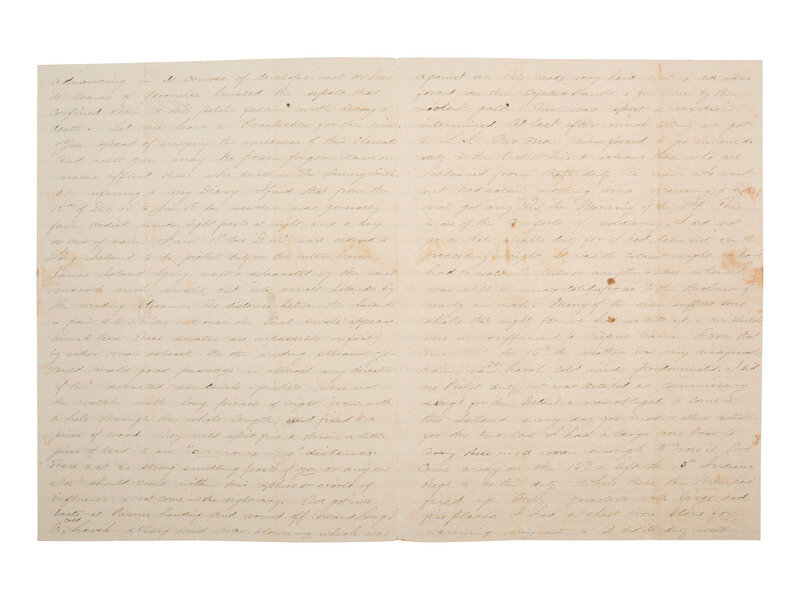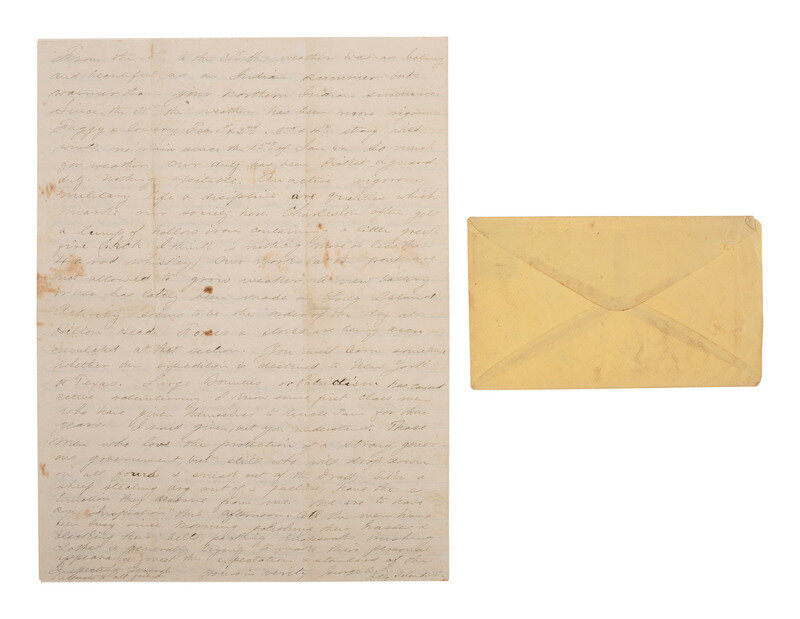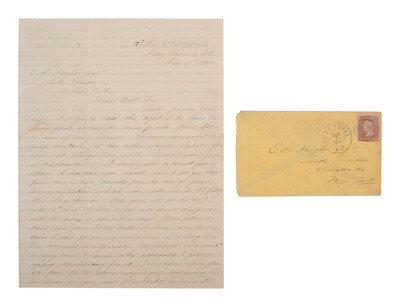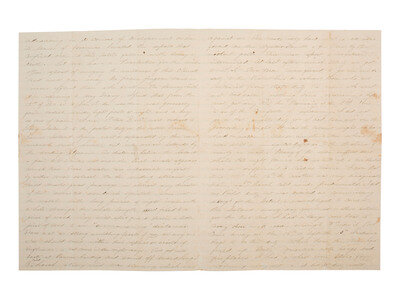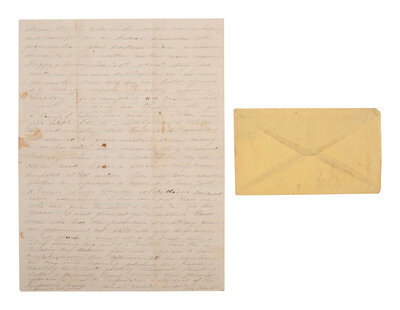Lot 455
[CIVIL WAR]. Soldier's letter describing the use of Greek Fire on Charleston. Folly Island, 1864.
Sale 1345 - American Historical Ephemera and Photography Online
Lots Open
Jun 19, 2024
Lots Close
Jul 2, 2024
Timed Online / Cincinnati
Own a similar item?
Estimate
$300 -
500
Lot Description
[CIVIL WAR]. Soldier's letter describing the use of Greek Fire on Charleston. Folly Island, 1864.
"Hd. Qrs. 117th N.Y. Vols, Folly Island, S.C." 4 February 1864.
4 pages, on bifolium, 7 1/2 x 9 3/4 in., creasing, spotting. With envelope addressed to E. S. Hughes, Esq. of South Trenton, NY. Stamped and cancelled at Port Royal 7 February 1864.
The writer explains that on the first of January, companies D and C were ordered to Long Island (South Carolina) for picket duty. He humorously describes the rebel picketers' muskets: "On the winding streams you could make good passage in almost any direction if the secreted sentinels & pickets were not on the watch with long pieces of right [sic] iron with a hole through the whole length, and fixed to a piece of wood. They will spit fire & throw a little piece of lead to an 'amazing' distance. These act as strong snubbing posts if you or any one else should come within their sphere or circle of influence, & not come in the right way."
After detailing weather patterns through the first few days of February, he speaks of the effectiveness of Greek fire he's witnessed being used against Charleston, writing: "Charleston often gets a lump of hollow iron containing a little greek fire (which I think is nothing more or less than 40. rod whiskey)."
The writer then speaks of duty and patriotism, opining that "Large Bounties of patriotism has caused active volunteering. I know some first class men who have given themselves to Uncle Sam for three years. I said given, but you understand. Those men who love the protection of a strong generous government, but still who will drop down on all fours & sneak out of the Draft like a sheep stealing dog out of a pasture, have the estimation they deserve from me."
After mentioning that his regiment is expecting an inspection that evening, he closes the letter and signs it "George B. F., Folly Island, SC."
George B. F. of the 117th New York Volunteers likely refers to George B. Fairhead of Company D, who enlisted as a private on 25 July 1862. He was mustered into Company D two days later. He was promoted to sergeant major and 2nd lieutenant, both ranks attained in the final year of the war, before mustering out as a member of Company F at Raleigh, NC in June of 1865.
4 pages, on bifolium, 7 1/2 x 9 3/4 in., creasing, spotting. With envelope addressed to E. S. Hughes, Esq. of South Trenton, NY. Stamped and cancelled at Port Royal 7 February 1864.
The writer explains that on the first of January, companies D and C were ordered to Long Island (South Carolina) for picket duty. He humorously describes the rebel picketers' muskets: "On the winding streams you could make good passage in almost any direction if the secreted sentinels & pickets were not on the watch with long pieces of right [sic] iron with a hole through the whole length, and fixed to a piece of wood. They will spit fire & throw a little piece of lead to an 'amazing' distance. These act as strong snubbing posts if you or any one else should come within their sphere or circle of influence, & not come in the right way."
After detailing weather patterns through the first few days of February, he speaks of the effectiveness of Greek fire he's witnessed being used against Charleston, writing: "Charleston often gets a lump of hollow iron containing a little greek fire (which I think is nothing more or less than 40. rod whiskey)."
The writer then speaks of duty and patriotism, opining that "Large Bounties of patriotism has caused active volunteering. I know some first class men who have given themselves to Uncle Sam for three years. I said given, but you understand. Those men who love the protection of a strong generous government, but still who will drop down on all fours & sneak out of the Draft like a sheep stealing dog out of a pasture, have the estimation they deserve from me."
After mentioning that his regiment is expecting an inspection that evening, he closes the letter and signs it "George B. F., Folly Island, SC."
George B. F. of the 117th New York Volunteers likely refers to George B. Fairhead of Company D, who enlisted as a private on 25 July 1862. He was mustered into Company D two days later. He was promoted to sergeant major and 2nd lieutenant, both ranks attained in the final year of the war, before mustering out as a member of Company F at Raleigh, NC in June of 1865.
This lot is located in Cincinnati.
Condition Report
Contact Information
Auction Specialist
